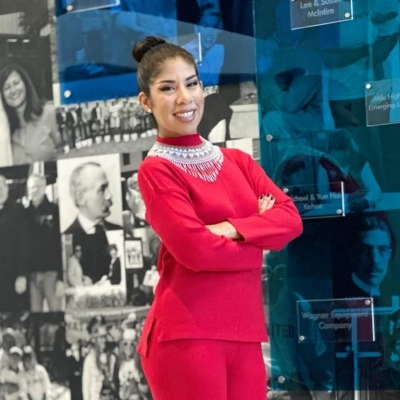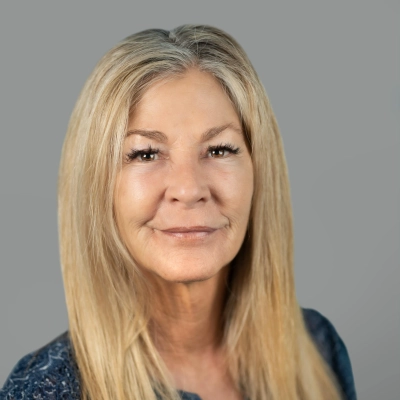15 Life-Changing Pieces of Advice for Your Younger Self
Looking back, many people wish they had learned important life lessons earlier. This article compiles 15 pieces of transformative advice, drawing on insights from experts in psychology, leadership, and personal development. These practical strategies cover everything from setting boundaries and understanding emotions to building authentic relationships and redefining success.
Clarify Your Values and Unique Strengths
I would tell my younger self to invest time early in clarifying your values and understanding your unique strengths. Through my experience building a personal brand, I discovered that this kind of deep self-reflection breeds genuine confidence in ways I never expected. The process helped me identify strengths I had never fully leaned into before, which transformed how I approached both challenges and opportunities. Most importantly, it freed me from the exhausting trap of trying to be everything to everyone. When you have clarity about who you are and what you stand for, decision-making becomes easier and your energy goes toward what truly matters. This self-awareness is foundational to emotional intelligence and would have saved me years of second-guessing myself.

Listen to Your Feelings as Guides
If I could give my younger self one piece of advice related to psychology and emotional intelligence, it would be this: "Don't rush past your feelings—listen to them, they're trying to guide you."
When I was younger, I treated emotions like obstacles. If I felt anxious, I pushed through. If I felt sad, I distracted myself. If I felt overwhelmed, I convinced myself I just needed to work harder. I thought being strong meant staying busy, staying productive, and never letting anything slow me down. But with time—and with the help of psychological training and personal growth—I learned that ignoring emotions doesn't make us stronger; it makes us disconnected from ourselves.
I'd tell my younger self that emotional intelligence begins with permission: permission to feel, to pause, to reflect. Emotions aren't there to derail us; they're signals. Anxiety might be pointing to a boundary crossed. Sadness might be reminding you of something that needs healing. Frustration may signal that your values are being overlooked. When we stop long enough to listen, we start making choices that are aligned with who we truly are, not who we think we should be.
I would share this advice because it would have changed the way I approached relationships, work, and self-care. Instead of trying to "fix" every uncomfortable feeling immediately, I would have learned to understand it first. I would have set healthier boundaries sooner, communicated more openly, and treated myself with more compassion.
In psychology, we often say that awareness is the first step toward change. That's the heart of this advice. When you slow down and tune in, you move from reacting to responding—from surviving your emotions to learning from them. And that shift can shape your entire life.

Name Your Needs and Express Them
I would tell my younger self to stop trying to be the strong one all the time and actually talk about what you need. Holding everything in only makes you look fine on the outside while you fall apart on the inside. I would share this because learning to name your needs early makes relationships easier, reduces resentment, and builds real emotional resilience. It saves you a lot of unnecessary pain.

Make Others Feel Heard First
I'd tell my younger self that being right doesn't matter if nobody feels heard. I used to walk into conversations armed with facts and logic, convinced that if I just presented my case well enough, people would obviously agree. I'd win arguments but damage relationships without even realising it.
The breakthrough came when I noticed people would agree with me in the moment but never actually follow through on what we discussed. They weren't truly convinced, they just wanted the conversation to end.
I learned that you have to let people arrive at conclusions themselves, even when you already see the answer. Ask questions instead of making statements. Let them talk through their concerns fully before offering solutions. It feels slower and less efficient, but people actually commit when they feel ownership over the decision.
Your younger self thinks influence comes from being the smartest person in the room. It actually comes from making others feel smart.

Practice Verifiable Vulnerability in Leadership
If I could give my younger self one piece of advice related to emotional intelligence, it would be to stop treating emotional honesty as a structural failure. The conflict is the trade-off: abstract emotional concealment creates a massive structural failure in communication and trust; verifiable emotional honesty secures the relationship's foundation.
When I was younger, I believed showing frustration or stress compromised my authority as a leader, so I enforced emotional silence. This created structural chaos because the crew couldn't diagnose the problem; they knew something was wrong but lacked the hands-on data (my honesty) to fix it. This forced them to rely on guesswork, which always compromises safety and morale.
I would share the advice to immediately implement the Hands-on "Verifiable Vulnerability" Protocol. This means sharing the simple, structural truth of my current emotional or logistical stress with my partner or my foreman in clear, verifiable terms (e.g., "I need two hours of silence to fix this financial issue," or "My focus is compromised today"). This trade-off—sacrificing perceived strength for immediate, truthful communication—secures the emotional foundation. The best way to lead is to be a person who is committed to a simple, hands-on solution that prioritizes verifiable emotional honesty to eliminate chaos and build trust.
Pay Attention to What Emotions Tell You
For the longest time, I avoided difficult emotions. I treated them like they were either a problem that needed to be fixed or something I needed to run away from. To me, strength meant letting difficult things go and not bother me. However, emotional intelligence isn't about not letting things bother you no matter what. It is about working to understand what and why you are feeling the way you are.
The times I have been anxious, it has usually meant that I needed some type of help or that I needed to figure something out. When I've been irritated, it has usually meant that I let someone cross one of my boundaries. Even the times I have felt numb have been informative: I was overwhelmed, not somehow broken.
If I could go back, I would tell myself to stop fighting my emotions and pay attention to what they're telling me. It's okay to pause and ask myself what is really going on. It takes strength to be kind to yourself when things are hard.
I wish that I had learned this sooner. It probably would've saved me from burnout and constant self-doubt.

Protect Your Energy Through Firm Boundaries
If I could give my younger self one piece of advice related to emotional intelligence, it would be to stop wasting energy trying to change difficult people and focus entirely on managing my own boundaries. Early in business, I thought competence meant endlessly trying to fix dysfunctional partners or employees, which just led to massive emotional drain.
The reason I would share this advice is that the single biggest drain on an owner's time and mental capacity is unnecessary emotional friction. I would tell my younger self that your primary job is to protect your own competence. This means quickly identifying people who consistently bring chaos, violate agreements, or refuse to communicate clearly.
The wisdom is simple: friction is a choice. You don't have to engage. I learned that the most intelligent decision you can make is establishing a clear, non-negotiable boundary—whether that means ending a contract or setting a firm rule on communication—to eliminate the source of chaos. Protecting your energy is the ultimate form of strategic competence.

Accept Awareness Without Requiring Control
I'd tell my younger self that awareness isn't control—and that's not failure. Understanding emotions doesn't mean eliminating them; it means learning to sit with them without panic. Early on, I equated emotional intelligence with composure, thinking calmness proved maturity. Over time, I realized real growth happens in naming what you feel without judgment and deciding how to respond instead of react. That shift changed everything—relationships became less performative and more present, creativity flowed easier, and self-compassion replaced constant self-editing. Emotional intelligence isn't about being unshakable; it's about being honest enough to stay open, even when it's uncomfortable.

Ask for Help Sooner and Openly
A piece of advice I'd give my younger self would be to ask for help sooner and more openly. You don't have to struggle through everything alone, and reaching out doesn't make you weak. Rather, reaching out can actually build connection, resilience, and clarity. Sharing what you're going through and openly communicating can bring new perspectives, emotional relief, and support you didn't realize was available. The sooner you learn to lean on others, the easier it becomes to navigate challenges with confidence and compassion for yourself.

Separate Worth From Achievement and Productivity
I would tell my younger self to stop tying your worth to achievement or how much you can do. You are more than your productivity, output, grades, or the expectations others have for you. When you believe that your value depends on constant accomplishment, ignore your needs, and lose touch with who you really are. Learning earlier that your worth is inherent rather than earned creates more self-compassion, healthier boundaries, and a life guided by authenticity rather than pressure.

Recognize Feelings Are Valid but Not Facts
If I could go back, the one piece of advice I'd give my younger self is this: Your feelings are valid, but they are not facts.
I would share this because, as a young person, I was a slave to every emotion. I operated on the assumption that if I felt something, it must be true, and I had to act on it right now.
If I felt defensive, I believed I was being attacked and had to fight back. If I felt anxious, I believed I was in danger and had to retreat. If I felt angry, I believed I was justified and had to prove it.
This advice is the core of emotional intelligence. It's the key to creating space between the feeling (the stimulus) and the action (the response).
I would have saved myself so much trouble just by learning to pause and say, "Okay, I'm feeling a huge wave of defensiveness right now. That's interesting. Why?" Instead of just lashing out, I could have gotten curious. I would have understood that feeling defensive doesn't mean the criticism is wrong; it just means I don't like being criticized.
It would have taught me that self-control isn't about not feeling things; it's about not letting your feelings hijack the steering wheel. It's the difference between saying "I am sad" and "I feel sad." You are not your emotion; you are the person experiencing it. And that separation is where all your power lies.

Invest in True Self-Care Early On
The messages around self-care in our society are superficial at best and financially or emotionally disastrous at worst. Lasting self-care looks like going to therapy, investing in friendships where you can be fully yourself, choosing to ask for help when you're feeling lost, investing in a self-compassion course, or finding a community that supports you in living out your spiritual beliefs and practices. You'll never see a ROI than investing in yourself, and if you prioritize true self-care when you're young, it can change the course of your entire life.

Understand People Instead of Fixing Them
If I could pull my younger self aside, the one piece of advice I'd give him is this: don't try to fix people, just understand them. When I first started out, I saw every problem as a technical challenge I could solve with logic or effort. If an employee was struggling, I'd try to reorganize their whole workflow. If a customer was angry, I'd throw discounts at the situation to 'fix' the complaint.
The truth is, most of what looks like a problem is actually just a communication gap or a failure to recognize where a person is coming from. That's emotional intelligence. You can't solve for someone's bad day with a checklist, but you can listen to them long enough to figure out the root cause. This changed how I run Honeycomb Air completely. Now, when a technician is underperforming, I don't start with disciplinary action; I start by asking, "What are you dealing with?"
I'd share this advice because it turns every difficult moment into a chance to build a better relationship. For a business owner, trust is the most valuable currency—more valuable than any tool or training. When my team feels heard, they show up and perform, and when a customer feels understood, they stay loyal. Learning to listen first and troubleshoot second would have saved me a decade of unnecessary stress and boosted my leadership a lot sooner.
Slow Down to Understand Your Emotions
In my opinion, the one piece of advice I would give my younger self about psychology and emotional intelligence is to slow down long enough to actually understand what you feel instead of racing past it. When I was younger, I treated emotions like interruptions. If something frustrated me or made me anxious, I would push it aside and keep moving. Eventually, that caught up with me during a project where a small miscommunication turned into a full blown conflict simply because I never paused to name what I was feeling. The moment I learned to recognize those signals, everything changed.
To be really honest, I would share this advice because emotional literacy becomes a superpower in adulthood. I once watched a mentor defuse a tense team meeting by simply acknowledging the tension in the room. No clever strategy, just awareness. That moment taught me that people do not follow the smartest person, they follow the one who understands themselves well enough to understand others. What I believe is that emotional intelligence is not about being soft, it is about being effective, and the sooner you learn that, the easier life becomes in every direction.
Consider Environmental Factors Shaping Behavior
I would tell my previous self to recognize that environmental factors often create more influence on human behavior than what people typically notice at first. This is the the significant importance of nurture in the old nature vs nurture debate. People can develop stress reactions because of their past experiences with instability and discrimination. Your understanding of someone's life experiences makes their reactions appear more understandable than personally challenging. Your ability to navigate tense situations improves when you understand the circumstances that lead to them. I provide this information because it helps mental health professionals understand the context which enables them to provide both equitable and successful treatment services. Social systems produce patterns which affect people instead of individual flaws becoming apparent to you. Your ability to connect with others becomes more precise when you understand their situation.





